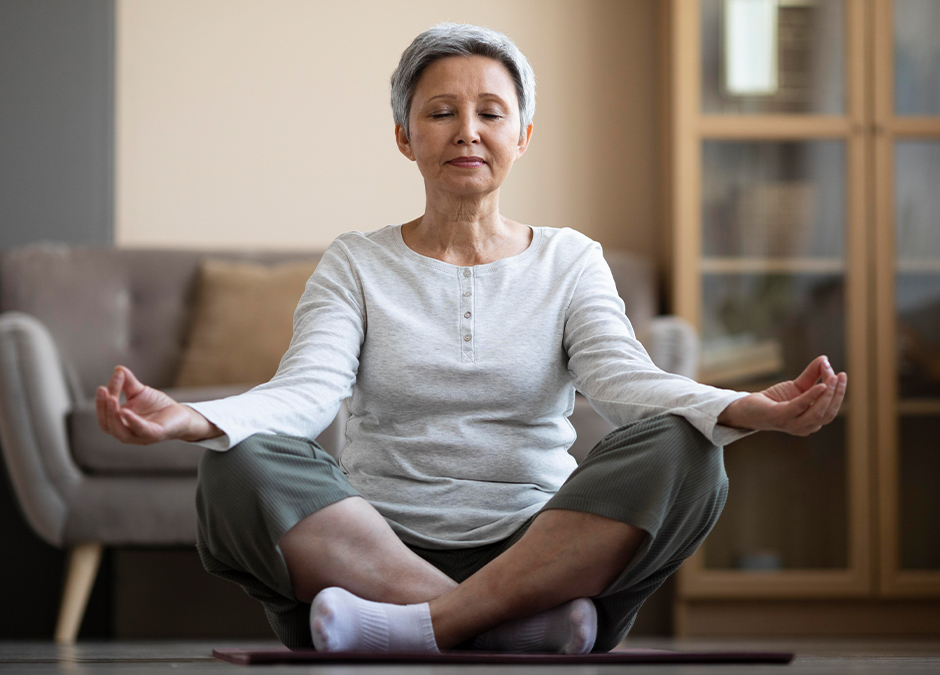It might seem like you’ll never stop having those moments when it feels like the furnace is turned up to 106 degrees, or you go from giddily happy to weepingly sad at the drop of a hat (literally), or that you will never, ever have another good night’s sleep.
Even while the symptoms might persist, menopause does indeed come to pass! And just like any other phase in our lives, there are small things that we can do to better our bodies and minds. For the sake of your health and having more of the rest of your life to look forward to, it’s important to pay close attention to your physical fitness after menopause to better understand what your body needs to stay balanced.
3 (Practical) Tips for Taking Care of Your Body After Menopause
We deliberately put the word “practical” in the heading above. Anyone can tell you to get a gym membership, go jogging for an hour every day, hire a nutritionist, and completely change your diet. But most of us have a tough time sticking to major changes like those for any length of time. Instead, consider the following more practical steps first and do what you can to make them part of your life. Then, things like jogging or joining a gym will be easier to tackle later on if you choose to do so.
Improve Your Nutrition – After menopause, your body needs good nutrition more than ever. You can start by balancing your diet, which means getting the right proportion of your daily nutrition from the three main macronutrients:
Carbohydrates – 45% to 65% of your daily calories
Fat – 20% to 35%
Protein – 10% to 35%
If you’ve never been able to balance your diet, at least try to cut out as much sugar and salt from the foods you eat. You can do that by staying away from processed and packaged foods, which, beautifully, will automatically help balance your diet.
Get Your Calcium – After menopause, lower estrogen production means your body doesn’t retain as much calcium from the foods you eat. Low levels of calcium can reduce your bone mass and make you more susceptible to osteoporosis.
In addition to eating a healthier diet, supplement your diet with calcium as needed. After menopause, you should get about 1,200mg of calcium every day to promote bone growth and reduce the chance of fractures. Additionally, Vitamin D supplements will help your body to absorb calcium.
Despite all the good they do, don’t start gobbling calcium and vitamin D. Too much of either can cause kidney stones, constipation, and/or abdominal pain.
Get More Active – First, always talk to your doctor before beginning any additional physical activities. Stop any activity if there is any sign of pain or discomfort.
Like just about everything else in your life, the end of menopause can make you gain weight. More activity will help you manage that. It has a few other desirable side effects too, like helping to avoid heart disease, obesity, high blood pressure, diabetes and osteoporosis. Better yet, it’ll help you sleep better and improve your mood! Your increased activity and breathing help carry more blood and oxygen to your brain, making it release serotonin and norepinephrine, both of which boost information processing and mood.
If you can’t get into a formal exercise routine, that’s OK. It helps to just get more active in any way you can. Things like parking further from the mall entrance, and taking the stairs instead of the escalator, can make a difference. If you can manage it, regular walking, jogging, bike riding and/or swimming are great for your heart and they also help lower your bad cholesterol.
Also, consider moderate weight training too. We’re not talking about kettlebell routines and bench presses – unless that works for you. There are plenty of bodyweight exercises (using only your body weight, no extra weights) that deliver similar results as if you went to a gym. Emptying the dishwasher? Do some squats while you’re at it.
In addition to toning your muscles, strength training can improve your balance and posture, boost your metabolism and reduce symptoms of osteoporosis and osteoarthritis.
You can be as healthy as ever after menopause. In fact, if you manage to eat a nutritious, balanced diet and get more regular activity into your life, you’ll be surprised at how it can boost your energy levels, improve your mood and confidence, and keep you looking great!
Original article reference:
http://www.feedspot.com/?dadi=1#feed/fof_fo_r__f_4464428/article/5637969509?dd=4311522799280929

